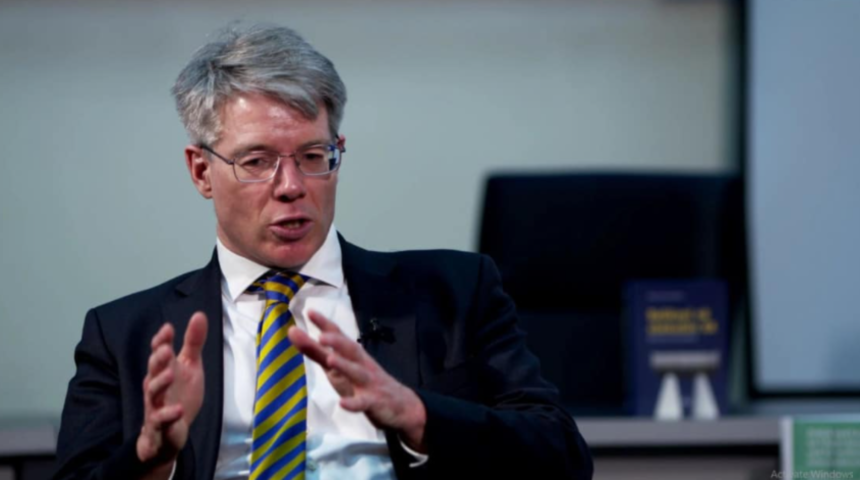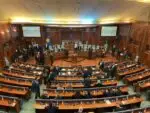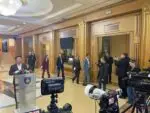While observing the geopolitical situation and reflecting on Kosovo’s identity, renowned Swiss historian Oliver Jens Schmitt sounds an alarm. He says the country must prepare “for a possible military conflict.”
“It would be more important to talk about military defense, civil protection, hospitals, emergency plans, and seriously prepare them, rather than discussing language and literature,” says Schmitt.
According to him, alongside the Republic of Moldova, Kosovo is one of the most endangered countries in Europe. “In Kosovo, the risk of war is not being discussed as seriously as in other European countries. What is needed now is not debates about identity, but serious preparations for an attack,” Schmitt says.
As a stable democracy, Schmitt describes Kosovo on the 17th anniversary of its independence. The member of the Austrian Academy of Sciences says that within the Albanian culture, Kosovo has its own culture—not in the linguistic sense, but in the political sense. Schmitt, who studies the past and is also a keen observer of the Balkans, says that Kosovo differs significantly from Albania, where the legacy of Enverist culture persists.
He says political Islam is advancing in Kosovo and gaining followers, especially among the younger generation. According to him, the question is how Kosovo positions itself between Europe and the Islamic world.
“But these questions must be answered by Kosovars themselves,” he says. According to Schmitt, the administration of U.S. President Donald Trump seems no longer willing to guarantee Europe’s security.
In such a case, the renowned scholar believes Trump’s approach has dramatic consequences for the EU. He considers that EU countries are not militarily prepared for a conflict with Russia, reports Koha.net.
“Without American protection, the EU should expect a Russian attack,” he says for Koha.
In this context, he also mentions Kosovo as a vulnerable country. He says that alongside Moldova, Kosovo is one of the most endangered states in Europe and advises Kosovo to make serious preparations for an attack.
Born in 1973 in Basel, Switzerland, Oliver Jens Schmitt, professor of Southeastern European history at the University of Vienna, says the Serbian government is under great pressure and may attempt to organize a conflict with Kosovo. He points out that Serbia has rearmed massively in recent years. He says that the U.S. presence in Kosovo has prevented Serbia from using these weapons, and the EU cannot replace the United States as Kosovo’s protective power.
“Therefore, it would be important for Kosovo to quickly have a stable government that prepares, with all major parties, society for a possible conflict,” says Schmitt, who has studied Byzantium, Greek philology, modern Greek, and Eastern European history at renowned centers in the German-speaking world such as Basel, Vienna, Berlin, and Munich.
Given the geopolitical situation, Schmitt says now is the time for Kosovo to prepare as a state for a possible military conflict. According to him, instead of identity debates, it would be more important to talk about military defense, civil protection, hospitals, and emergency plans.
The scholar, who lives in Vienna, has extensive academic and teaching experience in various European countries. He has taught at the universities of Munich and Bern, and for some time was also a professor at the Collège de France.
Since 2017, he has been head of the Department of Humanities and Social Sciences at the Austrian Academy of Sciences and also leads the research department for Balkan studies at the Institute for Modern and Contemporary History of Austria’s highest scientific authority. His interests in history are very broad, with a focus on the medieval period and the Adriatic region of the Balkans, as well as Romania. Schmitt’s contributions also extend to the medieval Albanian world, with titles such as Venetian Albania, Kosovo, Skanderbeg, and The Albanians.
In March 2022, at the Academy of Sciences and Arts of Kosovo, he promoted his work The Balkans in the 20th Century – A Post-Imperial History and the five volumes of archival publications by the Austrian Academy of Sciences about Kosovo, prepared by Schmitt and Eva Anne Frantz. The volumes include reports from Austro-Hungarian consuls regarding Kosovo from 1870 to 1914.







